The tech world is buzzing with anticipation, and for good reason. Anthropic has just dropped Claude 3.7 Sonnet, and it’s not just a minor update – it’s a seismic shift in the landscape of language models, particularly for developers. Forget incremental improvements; Claude 3.7 Sonnet is being hailed as a major leap forward, overshadowing its predecessors and even posing a serious challenge to models from industry giants like OpenAI. But is it all hype, or does Claude 3.7 Sonnet truly live up to the bold claims, especially when it comes to coding and beyond? Let’s dive into the details.
Coding Prowess: Setting a New Gold Standard#
If you’re a programmer, Claude 3.7 Sonnet is designed to get your attention. Early assessments position it as a top-tier coding model, potentially the best in the game right now. This isn’t just about handling simple scripts; we’re talking about excelling in complex coding tasks and real-world programming scenarios. Anthropic emphasizes that Sonnet is now faster and more intelligent than previous versions, maintaining top-tier performance while significantly increasing speed.
Benchmark results are backing up the buzz:#
- Benchmark Dominance: Claude 3.7 Sonnet isn’t just inching ahead; it’s outperforming previous models, including OpenAI’s, in rigorous benchmarks like SWE-Lancer. This benchmark is crucial as it reflects effectiveness in tackling diverse, real-world programming challenges.
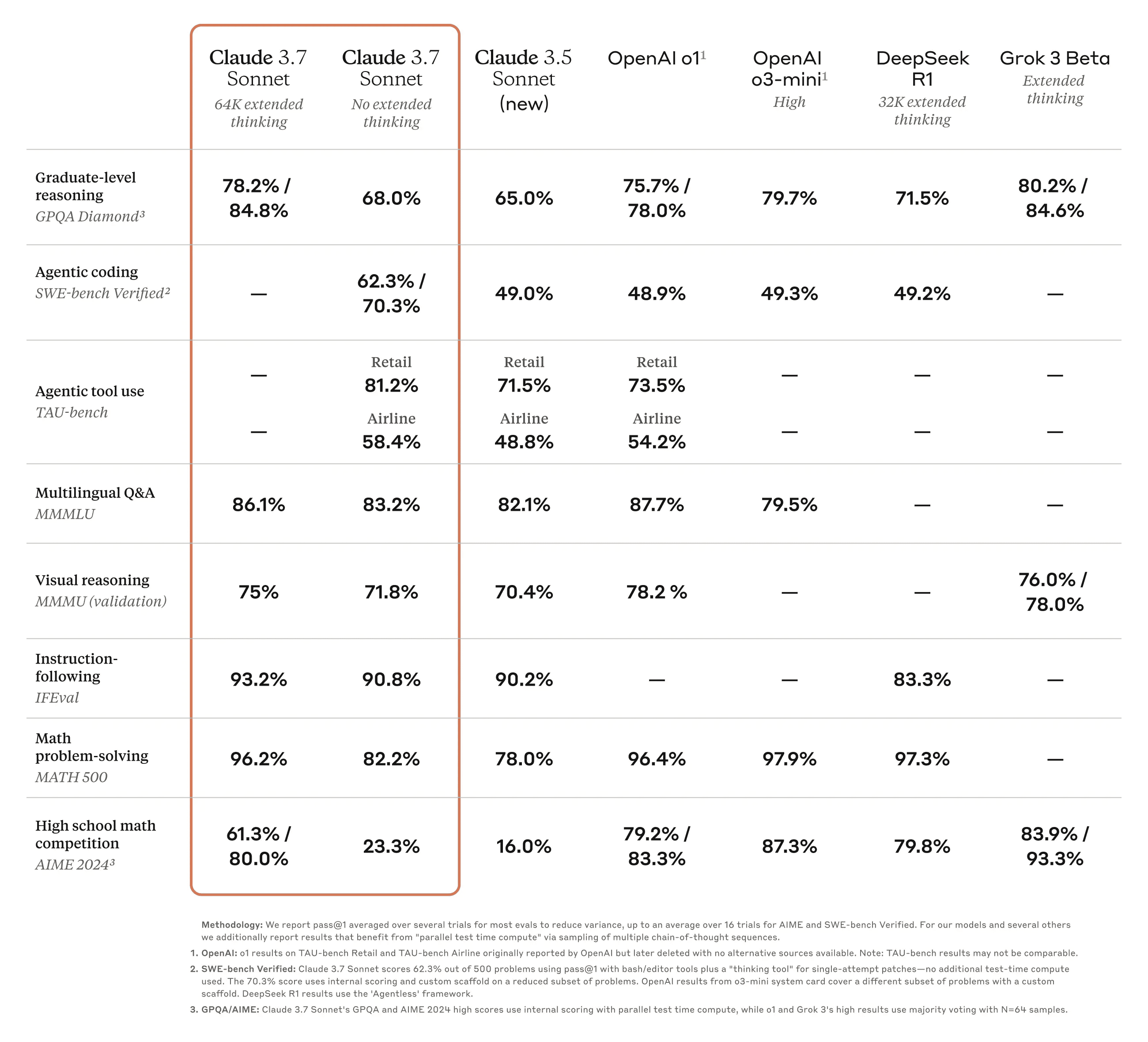
- HumanEval Success: Achieving a 70.3% success rate on the HumanEval benchmark is no small feat. This signifies a substantial improvement in its ability to solve complex coding problems.
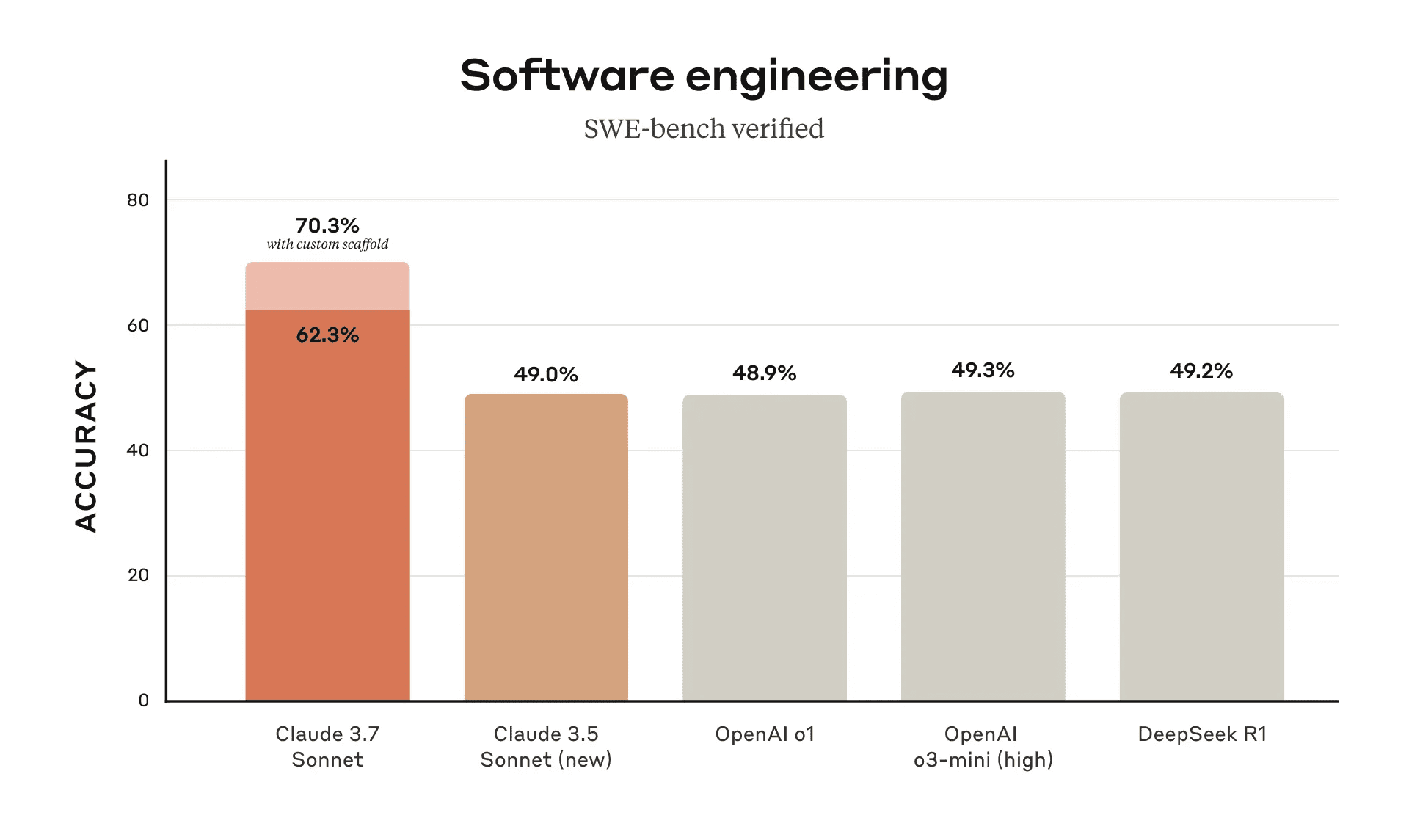
- Tool Mastery: Claude 3.7 Sonnet isn’t just a code generator; it’s a master of tools. Its proficiency in utilizing instructions for specific actions, like API interactions, makes it exceptionally well-suited for intricate, agentic workflows.
- Instruction Following and Multilingualism: It continues to lead the pack in instruction following, ensuring it understands and executes your commands with precision. Furthermore, its strong multilingual question-answering capabilities broaden its appeal to a global developer audience. Anthropic highlights its improved understanding of nuanced instructions, especially in complex, multi-turn conversations.
- Reasoning Fundamentals: It shows solid performance in basic reasoning and word manipulation tasks, essential for understanding and processing complex code logic.
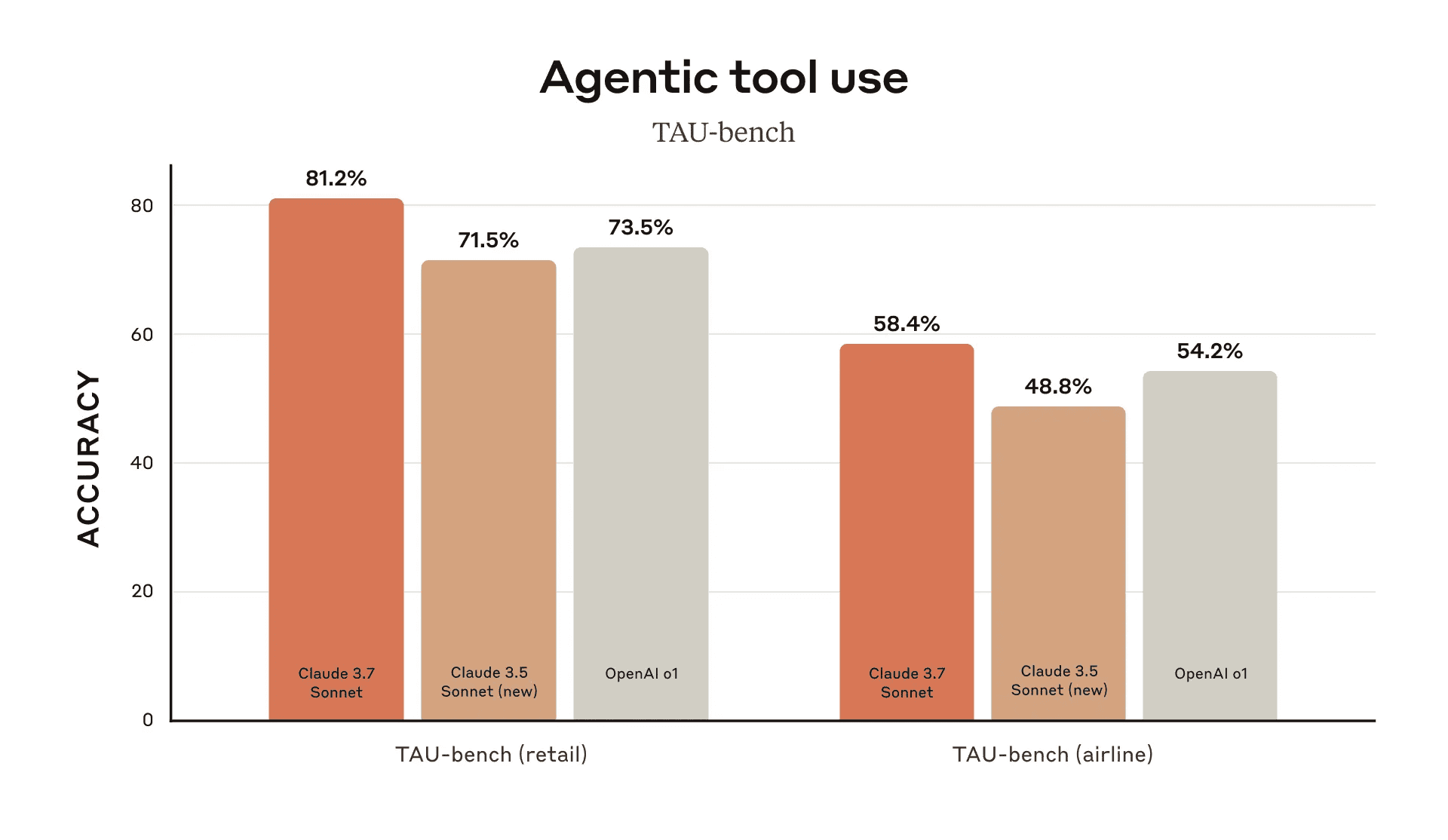
- Complex Reasoning Hurdles: When faced with truly complex reasoning puzzles, like a convoluted hourglass challenge, it can falter, even in its “thinking mode.”
- Math Problem Weakness: Interestingly, it underperforms in math problem-solving compared to some earlier models. This suggests a specialization towards coding and language-based tasks rather than numerical reasoning.
- Chess Engine Hiccup: In a demanding test – coding a chess engine – Claude 3.7 Sonnet could generate a large volume of code and even fix compilation errors. However, the engine ultimately failed to make legal chess moves, revealing potential weaknesses in generating logically sound programs for complex games.
- Front-end UI Excellence: On the brighter side, it shines when generating front-end user interfaces. It’s shown to surpass models like OpenAI’s 03 Mini High in both code quality and the actual functionality of the UI it creates.
Beyond Coding: Expanded Capabilities#
Claude 3.7 Sonnet isn’t solely focused on code. Anthropic emphasizes its enhanced capabilities across a broader spectrum:
- Visual Capabilities: The model boasts stronger vision capabilities, adeptly handling a wide range of visual formats including graphs, charts, and images. This makes it more versatile for tasks involving visual data analysis.
- Agentic Workflows: It is designed for complex agentic workflows, excelling in tool use and multi-step reasoning, making it suitable for sophisticated AI applications.
- Customer Support and Sales: Anthropic specifically points out its suitability for customer-facing roles, including customer support and sales, due to its improved conversational abilities and nuanced instruction following.
- Knowledge Retrieval: Claude 3.7 Sonnet is also highlighted for its improved knowledge retrieval from extensive datasets, making it a valuable asset for research and information-intensive tasks.
Meet Claude Code CLI: Your New Command Line Companion#
Anthropic isn’t just releasing a model; they’re building an ecosystem around it. Enter Claude Code, a brand new Command Line Interface (CLI) designed specifically for developers. This tool is a game-changer for how programmers interact with codebases:
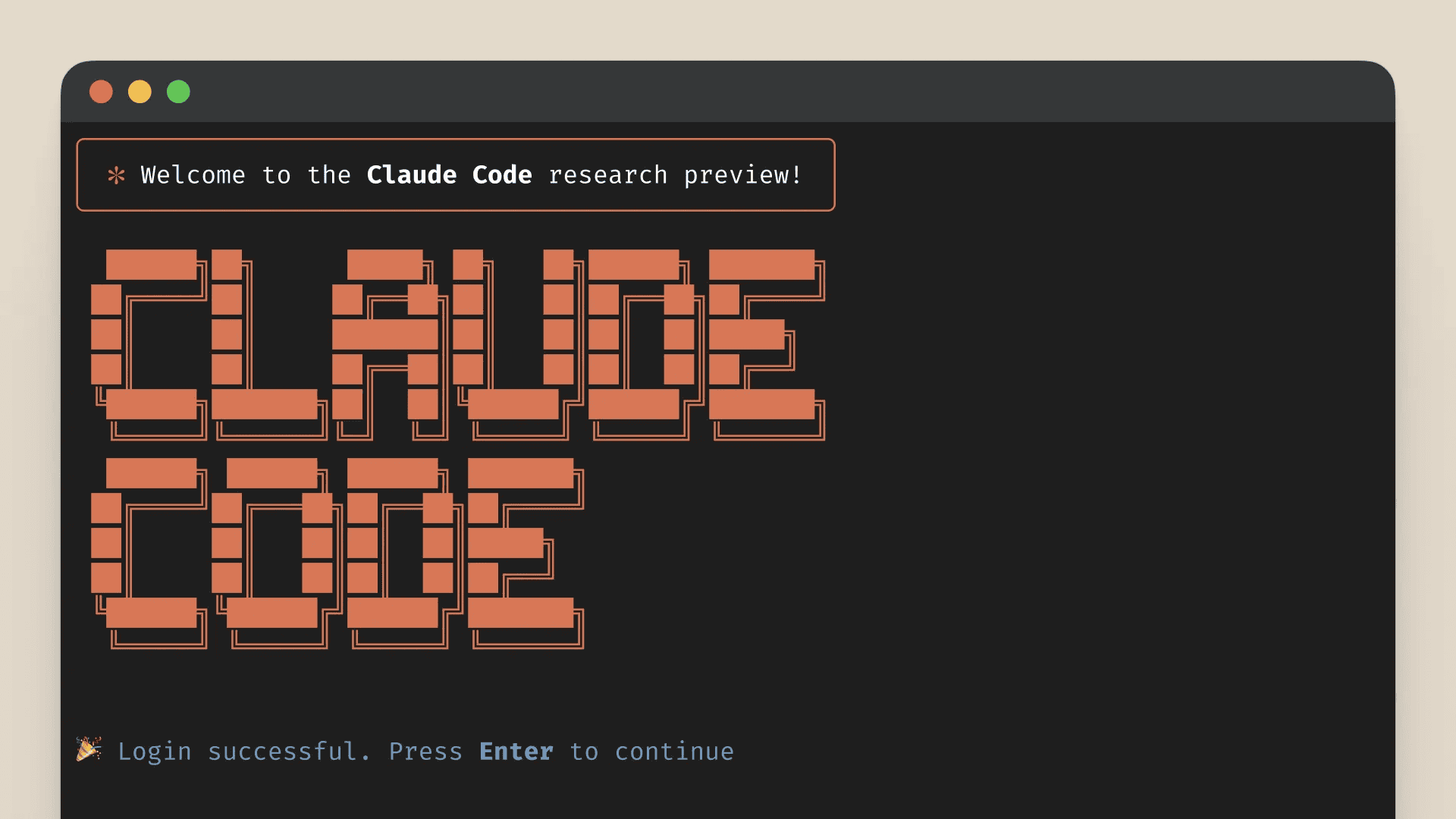
- Streamlined Workflow: Claude Code is all about simplifying development. It allows you to directly interact with your code projects through Claude, promising a more intuitive and efficient workflow.
- Key Functionalities:
- Project Scanning (
initcommand): Quickly analyzes and understands the structure of your projects. - Cost Tracking (
costcommand): Keeps an eye on your Anthropic API usage costs, essential for budget-conscious developers. - Test-Driven Code Generation: Facilitates building robust code with a focus on testing from the outset.
- Project Scanning (
- Challenging Existing Tools: Claude Code is stepping into the arena of IDE extensions like Cursor, offering a fresh approach to code refactoring and project management directly from the command line.
- Easy Installation: Get started quickly with installation via npm.
- Cost Awareness: It’s important to remember that Claude Code utilizes the Anthropic API, which, while powerful, can be on the pricier side.
Unveiling the “Thinking Mode”: A Glimpse into AI Reasoning#
Claude 3.7 Sonnet is being touted as the first hybrid reasoning model, offering a unique “thinking mode” that provides unprecedented transparency into its cognitive process.
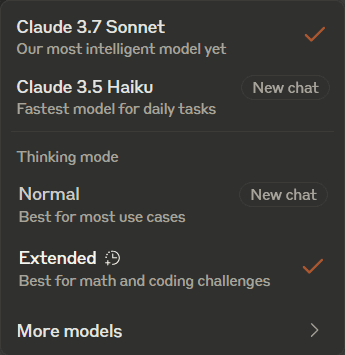
- Transparent Reasoning: The “thinking mode” allows users to actually observe Claude 3.7 Sonnet’s reasoning steps as it tackles a problem. This level of insight is groundbreaking and could be invaluable for understanding how AI models arrive at their conclusions.
- Thinking Mode Nuances: Interestingly, early tests suggest that in very complex puzzles, the “thinking mode” might not always lead to the most optimal solution compared to the standard model. This hints at the complexity of AI reasoning and the potential for different approaches to be more effective in different situations.
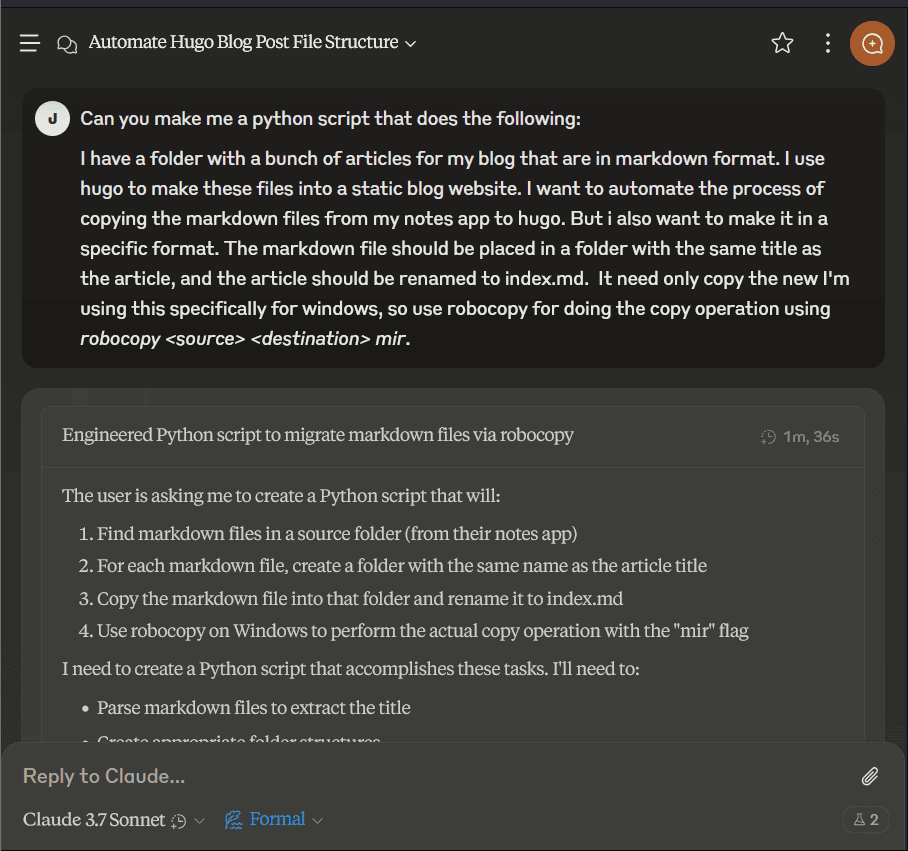
Cost and Access: Premium Power at a Price#
While Claude 3.7 Sonnet offers impressive capabilities, it’s essential to consider the cost:
- Priced Similarly to Claude 3.5: The model is priced similarly to its predecessor, Claude 3.5. Which is:
In both standard and extended thinking modes, Claude 3.7 Sonnet has the same price as its predecessors: $3 per million input tokens and $15 per million output tokens—which includes thinking tokens.
- More Expensive than Budget Options: It’s significantly more expensive than more accessible models like 03 Mini.
- Affordable Alternatives: Services like T3 Chat might offer more budget-friendly ways to access Claude 3.7 Sonnet’s power.
Imperfections and the Path Forward#
Claude 3.7 Sonnet is undeniably powerful, but it’s not without its limitations:
- Occasional Errors: Like all AI models, it’s prone to errors, highlighting the ongoing need for careful code review and testing.
- Technology Integration Gaps: It may sometimes struggle to seamlessly incorporate specific technologies requested in prompts, such as TypeScript or Tailwind CSS.
- Complex Code Challenges: Generating error-free code for highly complex applications, like an encrypted app, can still be a hurdle.
The Verdict: A Powerful Tool with Evolving Capabilities#
Claude 3.7 Sonnet is a significant advancement in the world of AI language models, marking a notable step up in both speed and intelligence compared to previous models. Its exceptional coding capabilities, innovative CLI tool, broader skill set including enhanced vision and knowledge retrieval, and transparent “thinking mode” make it a compelling option for developers and businesses seeking cutting-edge AI assistance across various applications. While it’s not without its imperfections and comes at a premium price, Claude 3.7 Sonnet represents a major step forward and signals an exciting trajectory for the future of AI in software development and beyond. It’s a model to watch closely as it continues to evolve and potentially reshape how we work and interact with AI.
Sources: